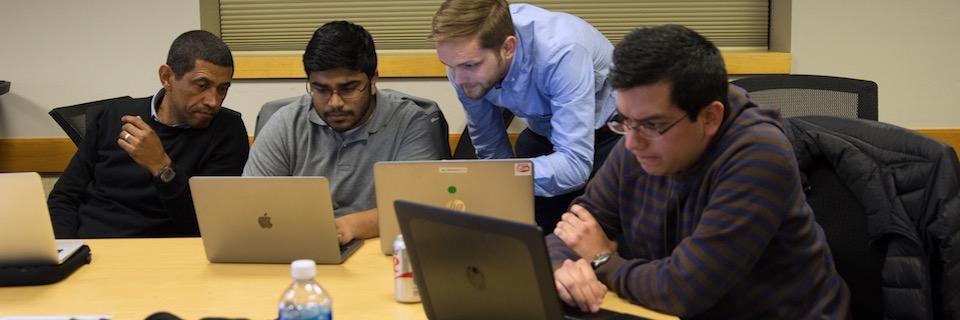Hackathon Has Helzberg Students Digging Into Real-Life Data

Say it’s a Tuesday. Clear skies but chilly. Team’s in first place. Can you predict how many people will show up before the game even starts?
That was the question before the business intelligence course taught by Xuan Pham, Ph.D., assistant professor of management and analytics, and Sandra Cannon, Ph.D., an adjunct instructor of management in the Helzberg School of Management. And, on Tuesday evening, they had less than two hours to come up with an answer in a team-based “hackathon” for the end of the semester.
Pham said she came up with the idea for the hackathon and enlisted the help of Caleb Overman, the lead data scientist for FanThreeSixty, a company associated with the Sporting KC soccer club that focuses on data analytics for enhancing the fan experience at a sporting event.
“I’ve really been wanting to do something like this for a while,” Pham said, “but it can be really hard to get your hands on real data.”
FanThreeSixty, by way of Sporting KC, was happy to oblige, lending actual data from the team’s 2012-2016 home games to the six groups in the course to pore through and design a model around. That data gave a snapshot of each match —the time it started, the day of the week, the team’s position in the standings at the beginning of the match, weather conditions — with the idea that each of those factors can affect ticket purchases ahead of time or day-of attendance. Using that knowledge, each team built a model that could accurately predict both the number of tickets sold and the number of tickets scanned for a given game. The team whose model got closest took home bragging rights — and some Sporting KC swag.
Sara Carmichael, a student in the Helzberg Master of Science in Business Intelligence and Analytics program, said being able to mine and organize data for something like a sporting event provided a unique peek behind the curtain that a lot of sports fans don’t get.
“I’m super excited to see the Sporting KC data and what we can get out of it,” she said before the challenge began. “I think soccer obviously has a loyal fan base, Sporting KC has a loyal fan base. So does the data hold that to be true?”
The ability to turn raw numbers back into real-life events is also its own particular challenge, said Patrick Hull, a student in the Helzberg School’s data science certificate program.
“It’s interesting to see a spreadsheet with a bunch of numbers on it and be able to put together the story of what happened that day, that game,” he said.
But it wasn’t just about building an engine— after devising their models, Pham said she added another challenge, asking each group had to present how it worked.
“Everything they’ve done in class has built toward a project like this,” Pham said. “And what’s really unique is that it puts together two components — they not only have to put together an accurate predictive model, they also have to figure out how to put it into production.”
That second part is a big part of what makes data science programs at the Helzberg School of Management stand out, she said. Students learn how to organize and interpret complex data streams and explain it in a way that makes sense to those without technical training.
And as part of a growing company, Overman said exercises like this one also give him a look at what could be the next wave of tech talent in Kansas City.
“We’re always looking for new ideas, new approaches for things like this,” he said.







